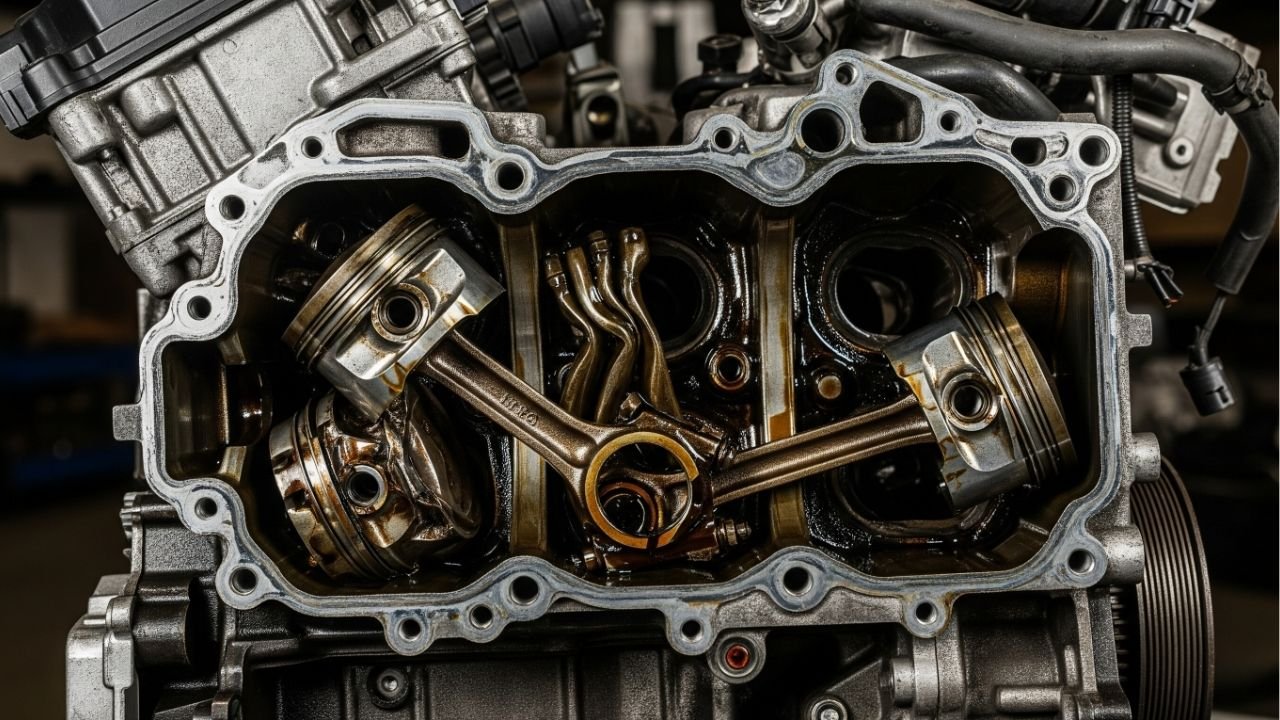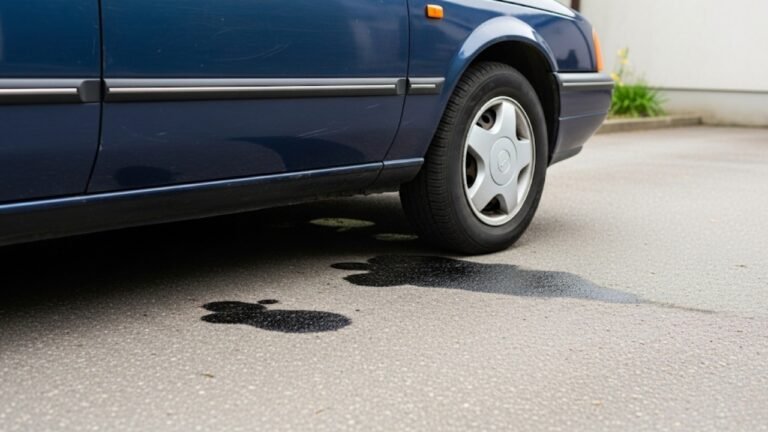Driving a Car Without Oil: The Silent Killer of Your Engine

Imagine this: you’re on the highway, music’s playing, windows down, and everything feels right—until your engine starts knocking like a hammer. You pull over, confused. No visible smoke, no warning lights earlier… but the truth hits hard. You’ve been driving a car without oil.
Sounds like a horror movie, right? Yet, it’s more common than you’d think. Some drivers unknowingly let their engines run dry. Others ignore oil change reminders. But either way, the outcome is the same: serious engine damage, emotional stress, and wallet pain that could last for years.
In this article, we’ll talk about what really happens when there’s no oil in your engine, why it matters, and how you can prevent a nightmare scenario. I’ll mix in relatable stories, technical facts, and even a personal experience that left me stranded on a rural road with a smoking hood and a broken heart.
Let’s dig into this like friends over coffee—one engine story at a time.
What Happens Inside When You Drive Without Oil?
Think of your engine as a living, breathing heart. Now imagine it trying to pump blood with no lubrication. That’s what driving a car without oil is like. Oil isn’t just fluid—it’s your car’s lifeline.
Engines have many metal parts. Pistons, crankshafts, camshafts, valves—all moving at high speed and under extreme pressure. Oil creates a slippery layer between these parts to reduce friction. Without it, metal grinds on metal. The heat builds up. Parts expand, crack, or seize. And the engine can literally melt from the inside.
Let’s simplify this:
-
With oil: smooth movement, reduced heat, long engine life.
-
Without oil: overheating, wear and tear, complete failure.
Here’s a real-world metaphor: Imagine running barefoot on hot pavement for miles. Your feet blister, burn, and you eventually collapse. That’s what your engine feels like without oil.
Many people think they can go “just a few miles” without oil. But even a minute or two of running dry can cause irreversible damage.
Why Oil is More Than Just Lubrication

Here’s what oil actually does:
-
Lubrication: Reduces friction between metal parts.
-
Cooling: Absorbs and dissipates engine heat.
-
Cleaning: Removes dirt and debris from engine components.
-
Sealing: Helps seal the gap between piston rings and cylinder walls.
-
Rust prevention: Forms a protective film on parts to stop corrosion.
Without oil, none of these functions happen. That’s like trying to work out in a desert with no water and dirty air. You won’t last long—and neither will your car.
I once ignored an oil warning light thinking, “Eh, I’ll top it off tomorrow.” By the next morning, the engine wouldn’t start. The mechanic said, “You might as well buy a new engine.” My heart sank—and my wallet cried.
Signs Your Car is Running Low or Out of Oil
You don’t have to be a mechanic to notice the signs. Your car speaks, just not in words. Here’s how it tells you something’s wrong:
-
Oil warning light: A red oil can icon on your dashboard.
-
Burning smell: Oil burning inside the engine smells sharp and unpleasant.
-
Knocking noises: That metal clanking is your engine begging for mercy.
-
Overheating: With no oil to cool it, the temperature spikes.
-
Poor performance: Sluggish acceleration, rough idling, or misfiring.
And the most obvious? Smoke from the engine. When oil’s gone, friction builds, and parts literally start burning.
Here’s a table to help visualize the difference between low oil vs no oil:
| Symptom | Low Oil | No Oil |
|---|---|---|
| Engine light | May flicker | Stays on or blinks urgently |
| Engine temperature | Slowly rises | Shoots up quickly |
| Noise | Slight ticking | Loud knocking or grinding |
| Performance | Slight dip | Significant loss or stall |
| Outcome (if ignored) | Gradual wear | Sudden and total engine failure |
Don’t brush off the warnings. Driving a car without oil is like playing with fire—except it’s your engine burning, not a candle.
How Long Can You Drive Without Oil? (Spoiler: Not Long)
Here’s the brutal truth: you might get 30 seconds to a few minutes, tops. That’s all it takes for your engine to go from functional to fried.
Cars are precision machines. Every second without oil adds stress, heat, and damage. Let’s say you’re driving at highway speed—your engine is turning at 2,500–3,000 RPM. That’s thousands of metal-to-metal contacts per minute. One dry spin, and it’s game over.
Here’s a simple metaphor: Try running a blender with no food, no liquid—just blades spinning against each other. That’s your engine with no oil. Doesn’t take long for it to burn out.
Some folks online claim, “I drove 10 miles without oil and was fine.” Maybe. But that’s like saying, “I smoked for years and didn’t get sick.” Doesn’t make it safe. Doesn’t make it smart. Most engines will seize up well before reaching 5 miles. And even if they don’t, the internal damage is done.
Real Stories: The Expensive Lesson of Neglect
We learn the hard way, don’t we? I remember one summer trip to the hills. My cousin’s old car was acting strange, but he brushed it off. “Just the heat,” he said. Turns out, he hadn’t checked the oil in months. Halfway up a steep hill, the engine stalled, smoke billowed, and we were stuck—40 kilometers from the nearest town.
The mechanic who towed us back had only one thing to say: “You’ve cooked the engine.” That one trip cost him over $2,000 in repairs.
Here’s another story from a friend who owned a used BMW. He skipped an oil change to save money. The engine locked up on a rainy night during a commute. He ended up taking a loan to replace the engine. “Never again,” he told me.
These aren’t rare stories. Every mechanic has them. Because driving a car without oil is like skydiving with a ripped parachute—you might make it once, but odds aren’t in your favor.
Bullet Points: Quick Facts That Might Save Your Engine
-
Engine oil should be checked every 1,000 to 2,000 kilometers.
-
A car without oil can seize up in under 60 seconds.
-
Oil changes are cheaper than engine replacements—by 20 to 50 times.
-
Synthetic oil lasts longer and provides better protection in heat.
-
A blinking oil light is an emergency—not a suggestion.
The Cost of Driving Without Oil
Let’s talk numbers—because that’s where the pain really hits.
| Damage Type | Estimated Cost (USD) |
|---|---|
| Engine Replacement | $3,000 – $7,000 |
| Engine Rebuild | $2,000 – $4,000 |
| Towing & Labor | $100 – $500+ |
| Temporary Car Rental | $200 – $500/week |
| Total Damage (Avg Case) | $5,000+ |
All this from skipping a $30–$80 oil change? It’s like ignoring a leaking roof and then paying to rebuild the whole house.
How to Prevent This Disaster: A Car Care Ritual Worth Keeping
Preventing the chaos of driving a car without oil is simple. In fact, it’s one of the easiest things you can do to protect your vehicle—and your wallet. Think of it like brushing your teeth. You wouldn’t skip that for weeks, right? Your engine needs similar care.
Here’s how you can turn car maintenance into a habit:
-
Check your oil level every two weeks. Pop the hood, pull the dipstick, wipe it, dip it again, and look. If it’s low, top it off.
-
Change oil every 5,000 to 10,000 kilometers, depending on your car and oil type. Don’t rely solely on the reminder sticker. Be proactive.
-
Watch for leaks. If you notice dark spots where you park, investigate immediately.
-
Listen to your engine. If it sounds louder than usual, rattling, or ticking, that’s a red flag.
-
Follow your owner’s manual. It tells you the exact oil your engine needs and how often it should be changed.
My uncle always said, “Oil is cheaper than metal.” And it’s true. A $50 oil change can save you thousands in damage. Build a routine around it—like checking oil every payday or when refueling. Make it part of your life rhythm.
Cultural Insights: How Different Drivers Treat Their Engines
It’s fascinating how culture shapes car maintenance habits. In some countries, car care is a weekly ritual. In others, it’s more of a “fix it when it breaks” mentality.
For instance:
-
In Germany, precision and regular maintenance are valued. Most drivers religiously check oil levels.
-
In Japan, routine service is part of ownership pride.
-
In South Asia, especially in rural areas, people often run cars till they die—fixing only what’s broken.
-
In North America, oil change services are common, yet many still push their luck, delaying oil changes.
Wherever you live, the truth stays the same: driving a car without oil will destroy the engine—culture doesn’t change chemistry.
Even in my hometown, we have this saying, “Gaari ke engine ka khayal, dil ke health jaisa hota hai.” (Caring for your engine is like caring for your heart.)
Treat your engine with respect—it carries you through life’s journeys.
What To Do If You Accidentally Drove Without Oil
Okay, let’s say you forgot. Or something unexpected happened. You’re already in the danger zone. What now?
Here’s what to do immediately:
-
Turn off the engine. Don’t try to limp home. Pull over safely and shut it down.
-
Check the oil level. If it’s dry, don’t start the car again.
-
Call for help. Get a tow truck or roadside service.
-
Tell the mechanic exactly what happened. Don’t sugarcoat it—they need the full picture to assess damage.
-
Prepare for a diagnosis. They’ll likely inspect for seized parts, warped components, or damaged bearings.
In some lucky cases, no major damage is done. But in most cases, expect a big bill—or a full engine replacement.
Lesson? Prevention is always easier than cure. Trust me. I once drove half a mile without oil after an emergency drain plug failure. Even though I stopped quickly, the piston rings were already damaged. That was a $1,800 lesson in humility.
FAQs: What Drivers Ask About Driving a Car Without Oil
1. Can you drive a car without oil for a short distance?
No. Even a short trip without oil can cause major damage. Your engine relies on constant lubrication. A few minutes can lead to a seized engine.
2. What happens to an engine with no oil?
Metal components grind together, overheat, and warp. You’ll hear knocking or ticking, and eventually, the engine will lock up.
3. How do I know if my engine was damaged by low oil?
Signs include engine noise, overheating, loss of power, oil pressure warnings, and in worst cases—engine failure. A mechanic can confirm internal damage with diagnostics.
4. What should I do if my oil light comes on while driving?
Stop the car as soon as it’s safe. Check the oil level. If it’s low, top it off. If it’s empty or leaking, call for help. Don’t drive further.
5. Can I just add oil instead of changing it?
You can top up in emergencies, but old oil becomes dirty and loses effectiveness. Regular oil changes are essential to clean and protect the engine.
6. How much oil does a typical engine need?
Most cars need 4 to 6 liters of oil. Always check your owner’s manual for exact capacity.
7. Is it better to use synthetic oil?
Yes. Synthetic oils offer better performance, longer life, and more protection under extreme temperatures—especially if you drive often or in hot climates.
8. How often should I check my car’s oil level?
At least once every two weeks or before a long trip. It’s a 2-minute task that can save you thousands.
Final Thoughts: Your Engine Deserves Better
Look, cars aren’t just metal and bolts. They carry memories, family trips, midnight drives, and journeys that shape who we are. Your engine is the heart of that experience. So when we ignore oil maintenance, we’re not just hurting a machine—we’re risking the stories we haven’t lived yet.
Driving a car without oil is like running your body without blood. It might keep going for a bit, but eventually, it fails. Don’t gamble on your engine’s life. Just like we take care of what we love, take care of your car too.
And if you ever feel overwhelmed with car care, remember—it’s okay to ask for help. We’re not born knowing this stuff. We learn it through trial, error, and sometimes—burnt pistons. But every mistake is a lesson, and every oil change is a promise: that your car’s story will keep going.






